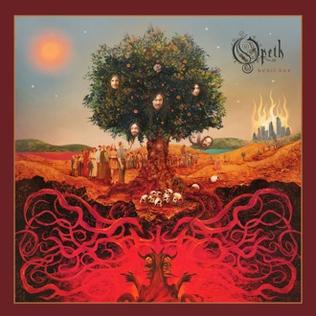
So here is the album on which Akerfeldt has finally dropped
his harsh vocals. This may have come as a surprise, but Opeth’s progression
over the years (from fairly standard death/doom on albums like Orchid and My Arms, Your Hearse to ever more progressive styles on later
albums, really starting with Still Life
but coming into full swing by its follow-up, Blackwater Park) should have made it clear that this was going to
happen.
Indeed, not only has he limited himself to clean vocals, but
nearly all semblances of metallic riffs are gone. This is, in essence, a
progressive rock album – and it goes 70s all the way (which is evident from the
awful artwork alone) – although this may please fans of retro-rock, it is
almost undeniable that instruments like the mellotron haven't been used in rock
or metal for a long time because they do not fit with modern production values,
and either drift into the background or stick out like a sore thumb. This is
indeed something which afflicts Heritage
– the balance is rarely correct, as the... thing seems to hold a very
consistent volume throughout the louder and quieter parts of the album which
creates a fantastic feat in being able to take the worst ailments of two
extremes and combining them.
This is exacerbated by the sheer lack of interest in which
the instrument is used – the way Opeth use it, one would think it had a range
in pitch of 6 or 7 semitones. Unfortunately, all the other instruments are
treated in the same way – despite their descent in quality (which, over the
last few albums, has been rather rapid), one of Opeth’s strengths has always
been creating instrumental parts which are compositionally intriguing. This is
gone. Simply slipped away to whatever far away planet Opeth have left their
inspiration at between albums.
This wouldn’t be a problem – indeed, many bands write
interesting music with little or no tonality – but the riffs, while complex,
simply have no staying power with the listener. No riff like the opener of ‘The
Grand Conjuration’, no riff like those in ‘Demon Of The Fall’, simply nothing.
This is inexcusable – not just for a metal album (which this quite plainly is
not), but for any rock album whatsoever. The only remotely memorable riff is
that which opens ‘The Devil’s Orchard’ – at least the band seem to know which
strong material to premiere before the album’s release.
That’s not to say that this is not quite clearly an Opeth
album – the vocals should be a clue, but the key pointer should be the
meandering middle sections, which often span several minutes. This is generally
a good idea in progressive rock, but these sections are applied so liberally
that individual songs often cease to have any reasonable form or structure.
Those who would defend the album (and several have told me this already) claim
that it is ‘classically informed’. Is it fuck. Whilst yes, classical music may
share the preponderance to expand over a length of time, it is key to note one
point – that when it is done in classical composition, it tends to at least
have some motif or other recurring theme upon which variations are done, rather
than disjointedly breaking from one section into another – a curse which Opeth
seem not to be able to rid themselves of.
I’m sure that the aforementioned lack of harsh vocals will
end up being the main talking point about this album, and there’s a good reason
why. Whilst I have praised Akerfeldt’s work in Bloodbath, and indeed earlier
Opeth, that is purely for his harshes. They have a richness to them, amplified
by the warm production on those albums, which make them a joy to listen to. By
comparison, and indeed by comparison to most vocalists, his cleans fall well
short. They’re not unlistenable, but purely lacklustre. They sound as though
there is no effort being put into them, and thus emotionless.
Simply put, this album is Damnation part 2. The least critically acclaimed album in Opeth’s back
catalogue, essentially replicated, but somehow they’ve managed to remove all
the parts which made even that album the least bit palatable along the way.
Sadly, Akerfeldt is resolute in his direction, and I really doubt now, moreso
than ever before, that Opeth will ever release another good album.
The link is from http://thetroopersofmetal.blogspot.com/
No comments:
Post a Comment